
current / archive / issues / faq / RSS feed / twitter /
3 Against The Torch!
| < previous | next > |
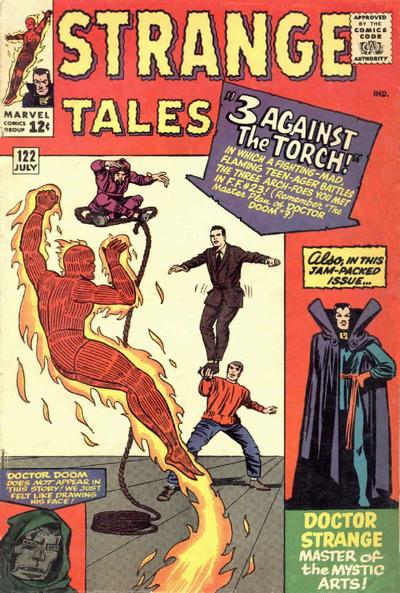 I'm a big fan of the cheeky daftness of this era of Marvel, so I love the fact that the cover says "Doctor Doom does not appear in this story! We just felt like drawing his face!" It reminds me of the humour of Leo Baxendale's Willy The Kid and other strips, mucking about with the form and joining in with the readers mocking the conventions of the format.
I'm a big fan of the cheeky daftness of this era of Marvel, so I love the fact that the cover says "Doctor Doom does not appear in this story! We just felt like drawing his face!" It reminds me of the humour of Leo Baxendale's Willy The Kid and other strips, mucking about with the form and joining in with the readers mocking the conventions of the format.
I also like the fact that it's not even true, as Doom appears throughout the start of the issue as it recaps the events of Fantastic Four #23... even though the issue itself says it was #22.
 As with the recap in Amazing Spider-Man #5, a lot of care seems to have gone into making sure that the recap matches the original story (a lot more care than was taken in making sure they got the issue number right!) with several panels being redrawn - again, reinforcing the Ontological Trust (hem hem) of the fictional universe.
As with the recap in Amazing Spider-Man #5, a lot of care seems to have gone into making sure that the recap matches the original story (a lot more care than was taken in making sure they got the issue number right!) with several panels being redrawn - again, reinforcing the Ontological Trust (hem hem) of the fictional universe.
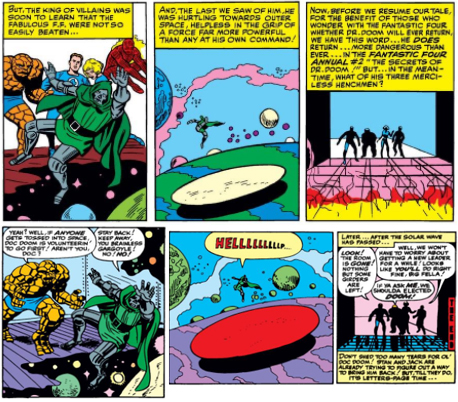 We also discover that Doom's three crooks were returned to our dimenson as soon as he fell into space... and that his knack for inspiring loyalty is undiminished, as the three of them decide to try and bring down the Fantastic Four themselves in order to please their boss.
We also discover that Doom's three crooks were returned to our dimenson as soon as he fell into space... and that his knack for inspiring loyalty is undiminished, as the three of them decide to try and bring down the Fantastic Four themselves in order to please their boss.
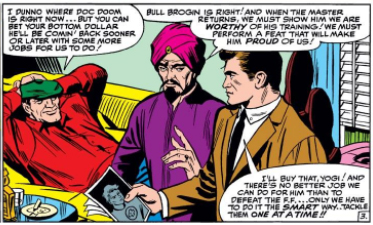 They then basically re-use Doom's old plan, flattering Johnny Storm for his knowledge of cars so they can kidnap him. This interrupts the Torch enjoying one of the recurring themes of this era of Marvel - watching television. Reading through these comics it's surprsing how much television turns up, it's the equivalent of every comic published today mentioning mobile phone apps or something.
They then basically re-use Doom's old plan, flattering Johnny Storm for his knowledge of cars so they can kidnap him. This interrupts the Torch enjoying one of the recurring themes of this era of Marvel - watching television. Reading through these comics it's surprsing how much television turns up, it's the equivalent of every comic published today mentioning mobile phone apps or something.
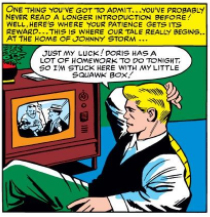 The rest of the issue is Johnny fighting the three crooks, and ends with him getting a telling off from his sister because their house got messed up when he was kidnapped. It looks as if he's in the doghouse but then, in the very last panel, the Torch addresses the reader directly to tell them it all worked out in the end.
The rest of the issue is Johnny fighting the three crooks, and ends with him getting a telling off from his sister because their house got messed up when he was kidnapped. It looks as if he's in the doghouse but then, in the very last panel, the Torch addresses the reader directly to tell them it all worked out in the end.
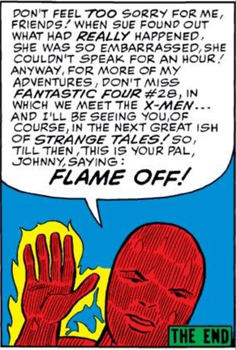 There's been plenty of interaction with the reader via captions, but this is the first time I've seen a character break the fourth wall in this way. Many years later other characters would do this on a regular basis, including future FF member She-Hulk, but this piece of metalepsis (why yes, I have been away on a week long Winter School where I learnt this term, why do you ask?) is completely out of the blue, not to mention slightly unnecessary. It's not like readers would be traumatised about Johnny getting told off in this way, so I'm not sure why Stan Lee felt the need to include his speech, but I guess it's a suitably wonky ending for a story that's been wonky from the start.
There's been plenty of interaction with the reader via captions, but this is the first time I've seen a character break the fourth wall in this way. Many years later other characters would do this on a regular basis, including future FF member She-Hulk, but this piece of metalepsis (why yes, I have been away on a week long Winter School where I learnt this term, why do you ask?) is completely out of the blue, not to mention slightly unnecessary. It's not like readers would be traumatised about Johnny getting told off in this way, so I'm not sure why Stan Lee felt the need to include his speech, but I guess it's a suitably wonky ending for a story that's been wonky from the start.
link to information about this issue
posted 5/3/2018 by Mark Hibbett
| < previous | next > |
Comments: